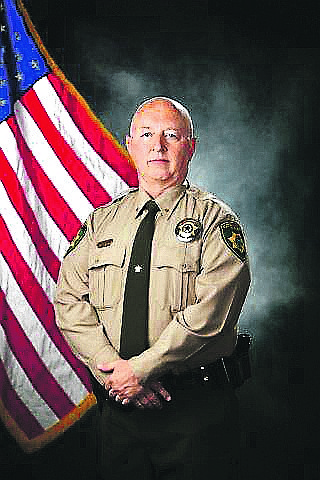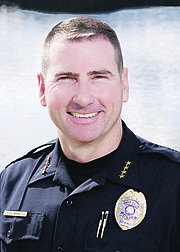What would defunding police look like in Kootenai County?
For the past three weeks, our national discussion has traversed the difficult terrains of racism and police brutality, unpacking tangential issues like hiring practices within law enforcement, people of color in the judicial system and the inequity of bail.
These contentious conversations ballooned to life on May 26, one day after a Minneapolis police officer was caught on cellphone video with his knee on the neck of resident George Floyd for 8 minutes and 46 seconds; since Floyd’s death, protests ignited around the world and, as of press time, continue to burn.
One particular dialogue within America’s racial divide that has gained traction in the past two weeks has stemmed from the idea of defunding police departments and law enforcement. But what does that mean? What does it look like? And could it happen here in North Idaho?
To local law enforcement, the idea is a recipe for disaster.
“Defunding law enforcement leads to anarchy,” Kootenai County Sheriff Ben Wolfinger said. “We are a country that is built on the rule of law. Lack of law enforcement results in one of two things: vigilantism or anarchy and lack of accountability.”
To Wolfinger and many others, the role of law enforcement dates back to the 1800s and the British transition from the law of monarchs to the law of cities, and that changing from those principles violate the very nature of what it means to be a police officer or sheriff’s deputy.
“The current model of law enforcement in this country came from England after Sir Robert Peel made drastic changes to professionalize law enforcement (as) a primary government function instead of the feudal system that had been in place,” Wolfinger explained. “The other side of that coin is no one to hold people accountable. No one to respond to help people when they call. No one to run towards the violent offender while everyone else is running away. I don’t see any advantages.”
Not all see defunding law enforcement as neutering by fiscal fiat the ability of law enforcement to police streets and keep the peace. Defunding the police in the George Floyd era has more often come to mean divesting money from police departments’ coffers and investing in other community endeavors, such as education and social services.
Protesters calling for police department defunding believe by investing in ideals like economic prosperity and fewer arrests, crime will naturally go down on its own over time. Minneapolis fully embraced this June 12 after its city council voted to not only defund but fully disband its police department and rebuild it from the ground up.
To be clear, since the George Floyd protests began, no organization has specifically called for the defunding — let alone dismantling — of the Coeur d’Alene Police Department, the Post Falls Police Department or the Kootenai County Sheriff’s Office.
Not even organizers of the local Black Lives Matter protests that rose up around Coeur d’Alene in the first week of June are asking for that.
“It’s not even necessarily ‘defund,’” said Kyle Fancher, organizer of the BLM protests that began in the Coeur d’Alene Winco parking lot June 1 and ended in front of City Hall June 4. “What they’re doing in Minneapolis personally isn’t what we’re going for. I think what I’m looking for is ‘demilitaraized.’ Let’s take away some of the tools they’re using, like gas masks and tear gas. Why are we giving our police these tools to use on their own citizens?”
Fancher added that a community-based police system could be a benefit to its residents while avoiding tragedy, citing Atlanta’s Rayshard Brooks — an African-American who was killed June 12 by police after falling asleep in a Wendy’s drive-thru, wrestling with arresting officers, grabbing an officer’s taser and discharging the non-lethal weapon as he ran — as an example of how a police department can make a bad situation worse.
“How different could that situation have been,” Fancher asked, “if we sent two social workers there? They could have pulled him to the side, where they would find out he was intoxicated, get him what he needed to resolve the situation, call a tow truck for his car, and get him home safely … I do believe a lot of crime could be stopped with de-escalation, rather than escalation, which is what police officers are taught.”
Coeur d’Alene Police Chief Lee White said the key to improving law enforcement’s efficiency and outreach requires a middle ground.
“I do not see an advantage to defunding police,” White said. “However, I do see a need for increased funding for programs such as mental health programs, lower-income assistance, health care programs and substance abuse programs. Defunding the police really means cutting some of the programs that are not absolutely essential to the law enforcement function, but services we provide simply because it is the right thing to do, such as youth outreach programs, victim advocacy, crime prevention and other community-based programs.”
Those extra steps law enforcement takes, Wolfinger added, is how community engagement grows.
“From our perspective, I think that we are community-based in as much as our vision and mission really stress service to our community,” Wolfinger said. “Time and again, I hear from citizens thanking us for the little extra help a deputy gave that was above and beyond them just doing their job. I believe that a community wants law enforcement professionals who know their job, know how to do their job well, but have a servant’s heart.”
But it’s those little details from call to call that Fancher said is what can fray a police officer’s nerves.
“I got to admit,” the Coeur d’Alene organizer said, “that would stress me out. To go from an armed robbery to answering a domestic disturbance with two people arguing? Then to something else? That (change) would be really stressful, and being a police officer is stressful enough.”
White said the three-week-long protests are taking their toll on departments everywhere — including, to a certain degree, here.
“Nationwide, morale in our profession is lower than at any point in my nearly 28 years of police work,” he said. “Friction between public safety and the communities they serve is a huge problem in many areas, but we do not experience that level of mistrust in our community. Our community does not have some of the societal issues that many of the large cities have and, moreover, our community trusts our officers to treat everyone with dignity, respect, and professionalism.”
Wolfinger said that defunding law enforcement is not a solution North Idaho should embrace anytime soon.
“Do I think that there are problems in our country?” Wolfinger questioned. “Yes. However, we did not get to these problems overnight, and the solutions cannot be knee-jerk like we are seeing in many areas of the country. Additionally, one size does not fit all when we look at solutions. What may work in New York City probably won’t work in Clark County, Idaho.”





